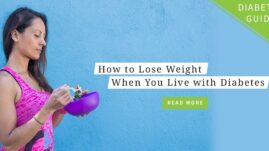Have you ever asked yourself, “Why am I gaining weight when I’m eating practically nothing?”
It could be the type of diet you’re following, or perhaps extra calories are sneaking in through frequent snacking or dining out. Or maybe cutting back on calories is actually contributing to the weight gain. Could that really be true?
This article will explore the factors affecting your weight, how overly restricting calories can harm your overall health, and the steps you can take to get back on track with your weight-loss goals.

Key Points:
- If you’re having difficulty losing or are gaining weight, a higher-protein diet may be more effective than other diets for weight loss.
- Incorporate regular physical activity, prioritize sleep, and manage stress, as these can impact weight-loss success.
- Certain medical conditions and medications can hinder weight loss or even contribute to weight gain. If you suspect this, consult your healthcare provider.
- Monitoring what and how much you eat significantly increases the chances of losing weight and maintaining it.
If you ask people how often they’ve gone on a diet to lose weight, many will likely say, “Too many times to count.” Maybe you’ve tried multiple times yourself, only to regain the weight — and then some. Or perhaps you didn’t lose any weight while dieting, or even gained weight. It’s undeniably frustrating.
While it may seem counterintuitive, eating fewer calories can sometimes lead to weight gain. This is often due to the body’s natural response to calorie restriction, known as metabolic adaptation or adaptive thermogenesis.
When you drastically cut calories, your body conserves energy by slowing your metabolism, making it harder to lose weight and easier to gain it.
Table of Contents
What the science says
You’re not alone in your weight-loss journey. The U.S. Centers for Disease Control and Prevention (CDC) reports that between 2013 and 2016, 49 percent of U.S. adults tried to lose weight within the past year.
More women (56 percent) than men (42 percent) were among those trying to shed pounds, and more than 160 million Americans are dieting at any given time.
Understanding the science behind weight loss helps explain why it can be so challenging, and why some people find it harder than others. However, the science isn’t as straightforward as we once thought.
The foundation of weight loss is a calorie deficit — when you consume fewer calories than your body uses, you lose weight. The body taps into its reserves (usually fat stores) to provide energy.
Based on this, we assume:
- Eating fewer calories than we burn leads to weight loss.
- Eating more calories than we burn leads to weight gain.
But the saying “a calorie is a calorie” isn’t entirely accurate. While a calorie is a unit of energy, the source and composition of those calories affect metabolism, satiety (feelings of fullness), and overall health differently.
For example, two diets with the same calorie count — like a low-fat diet versus a low-carb/high-protein diet — may not lead to the same weight loss.
Studies show that higher-protein diets often result in more weight loss by boosting satiety and energy expenditure. These diets also increase fat-free mass (muscle) and burn more calories, even at rest, compared to diets higher in carbs or fat.
Surprisingly, even eating, digesting, and storing nutrients burns calories. This process, called the thermic effect of food (TEF), accounts for about 10 percent of daily energy expenditure. TEF varies depending on the macronutrient composition of a meal:
- Protein: 20 to 30 percent of calories burned
- Carbohydrate: 5 to 10 percent of calories burned
- Fat: 0 to 3 percent of calories burned
In other words, protein has the highest TEF, followed by carbohydrates, with fat having the lowest.
Other factors that affect TEF include:
- Age: TEF tends to decrease as we age.
- Physical activity: More active people often have a higher TEF.
- Meal size: Larger meals increase TEF.
- Eating frequency: One large meal leads to a higher TEF than several smaller meals.
- Food processing: Less processed foods increase TEF.
In summary, the idea that “calories in, calories out” explains weight loss is outdated. Weight loss involves more than cutting 3,500 calories to lose a pound. Not all calories are equal, and factors like age, metabolism, activity level, and the types of food you eat all influence how much weight you’ll lose.
Other factors that affect weight loss
Calories still matter when it comes to weight loss — you need to be in a calorie deficit to shed pounds. However, beyond the nutrient composition of your diet, several other factors can influence whether you lose weight:
- Lifestyle habits: The types of foods and beverages you consume, along with how much time you spend sitting or lying down, can affect your progress.
- Environment: Where you live and work matters. Your access to healthy foods, a kitchen at work to store or prepare meals, and safe spaces to walk or be active all play a role.
- Sufficient sleep: Not getting enough sleep — or enough quality sleep — can disrupt appetite-regulating hormones, lower metabolism, and lead to frequent snacking on less-healthy foods, contributing to weight gain.
- Medications: Certain medications can make losing weight more difficult and may even cause weight gain. Examples include steroids, some diabetes medications, and certain blood pressure drugs.
- Health issues: Conditions like hypothyroidism, polycystic ovary syndrome (PCOS), eating disorders, and depression can lead to weight gain or make weight loss more challenging.
- Gut microbiome: The organisms in your gut, known as the microbiome, can influence how many calories you absorb from food. Studies show that people who are naturally thin tend to have a different microbiome composition than those who are overweight or obese.
Can eating too few calories decrease your metabolism?
In short, yes. Drastically cutting your calorie intake might seem like a quick way to lose weight, but it can backfire.
While you may initially lose weight, your body will adapt to the reduced energy intake by slowing down your metabolism, a process known as metabolic adaptation or adaptive thermogenesis.
Here’s why this happens:
- Reduced metabolic rate: Slashing calories forces your body to conserve energy, leading to a lower metabolic rate. As a result, you burn fewer calories, which slows down your weight loss over time.
- Persistent metabolic slowdown: A slower metabolism can continue even after you stop dieting, which helps explain why many people regain weight after a period of calorie restriction.
- Muscle loss: Very-low-calorie diets (800 to 1200 calories per day) may be effective for short-term weight loss but aren’t ideal for the long term. Extreme calorie restriction can lead to muscle loss, which lowers your metabolism and decreases the number of calories you burn at rest. This can contribute to weight gain even if you’re eating less.
- Hormonal changes: Hormones that regulate hunger and satiety can also be affected by calorie restriction, potentially leading to weight gain. Hormonal imbalances can play a significant role in weight gain, even when calorie intake is low.
How tracking your food intake impacts weight loss
Tracking your food intake while working on losing weight can significantly impact how much weight you lose.
Though it may seem tedious, research shows that between 18 percent and 70 percent of people underreport their food intake. This doesn’t mean people are deliberately misrepresenting what they eat — it can simply be difficult to accurately gauge how much you’re eating, especially without weighing, measuring, or tracking your meals.
Using a food journal or a tracking app can help keep you accountable for what, when, and how much you eat. If you’re honest with yourself, tracking can be very revealing. Here’s how keeping a food journal can help with weight loss and maintenance:
- You learn about your eating habits, such as how often you eat, whether you skip meals, or if you frequently eat out.
- You identify foods you tend to eat regularly, including your “go-to” comfort foods when watching TV or having a bad day.
- You begin to connect what you eat with how you feel — are you eating out of boredom or because you’re feeling down?
Another important part of food tracking is becoming more aware of portion sizes. Since people tend to underestimate how much they eat, weighing and measuring your foods — at least temporarily — can give you better insight into your actual intake.
Studies show that those who track and measure their portions tend to lose more weight than those who don’t. Periodically tracking and measuring, even after reaching your goal weight, can help prevent regaining the weight you’ve lost.
Why undereating could be hurting your health
Very-low-calorie diets may seem appealing, and when closely monitored by a healthcare provider, they can help with short-term weight loss.
However, severely restricting your calorie intake can put your body into a state of starvation, increasing the risk of malnutrition and potentially serious health issues, such as:
- Loss of muscle mass
- Loss of heart muscle, leading to a slow heart rate and low blood pressure
- Reduced lung capacity, causing difficulty breathing
- Numbness and tingling in the hands and feet
- Low body temperature
- Fluid buildup in the arms, legs, and abdomen
- Dry hair and skin
- Hair loss
- Impaired ability to fight infections and heal wounds
- Anemia
- Osteoporosis
- Difficulty concentrating
- Depression and anxiety
Additionally, not eating enough can increase the risk of developing eating disorders or disordered eating. If you experience any of these symptoms, particularly while on a weight-loss plan, it’s important to let your healthcare provider know.
Tips to help you lose weight and keep it off
Losing weight isn’t easy, and the risk of regaining weight is high.
Plus, weight loss isn’t always a linear process — you’ll likely have days or weeks when you lose weight, along with times when you hit a plateau. This is completely normal! Don’t let a plateau discourage you.
If you’re not losing weight despite cutting calories, try these steps to boost your chances of success:
- Consult your healthcare provider and dietitian: Develop a safe weight-loss strategy that fits your lifestyle and food preferences. Discuss whether a higher-protein diet might be right for you.
- Set realistic goals: Break them into long-term and short-term targets. For example, your long-term goal could be to lose 25 pounds over three months, while a short-term goal could be losing 1 to 2 pounds per week.
- Measure your portions: Use a food scale and measuring cups to help control portion sizes.
- Track your intake and activity: Keep a record of what you eat and your physical activity using a notebook, spreadsheet, or smartphone app.
- Get moving: Aim for at least 150 minutes of physical activity each week. Start slow and increase your activity gradually.
- Prioritize sleep: Sleep and weight loss are closely connected. Not getting enough sleep can make losing weight harder.
- Weigh yourself regularly: Weighing in once a week can help you catch and correct any upward trends in your weight.
- Manage stress: Chronic stress can lead to overeating and weight gain, so finding healthy ways to cope is essential.
- Seek support: Lean on family and friends, or consider joining a weight-loss group or program for encouragement.
- Check in with your healthcare team: If you’re stuck in a plateau, not feeling well, or feeling discouraged, reach out for guidance.
- Celebrate small victories: Focus on improvements beyond just the number on the scale, like better sleep or increased energy.
Key takeaways on your weight-loss journey
Losing weight is a journey with inevitable ups and downs (literally!). Keep in mind that everyone’s weight loss timeline and progress are different, both in how long it takes and how much weight is lost.
If you’re gaining weight despite eating less and being more active, consider other factors that could be affecting your progress, such as lack of sleep, stress, medications, or underlying health conditions.
Collaborating with a dietitian or your healthcare team can help you identify and address these challenges, so you can stay on track toward achieving your weight loss goals.
Did you find this article helpful? Click Yes or No below to let us know!





Isla Fisher
I faced the same issue! Eating less backfired. A higher-protein diet, better sleep, and less stress made a huge difference. Tracking meals also helped me stay aware. Keep going, you have got this!
Angela
I don’t know why this is not studied properly, but I follow a diet Mincavi where we lose weight even hundreds of pounds by eating more food, healthy foods in appopriate quantaties. Some people do eat too much before starting the diet, but most people find it hard to eat all that food. I eat like a bird and it is only when I eat my 3 meals and 3 snacks do I lose weight. This is barely ever talked about but it is a problem that is much more frequent then we think. Being fat does not mean that a person eats too much.
Emmy
I’ve been in a calorie deficit for about two weeks and I’ve been counting my calories and taking about 1200 calories and excercise 4-5 times a week. Haven’t been seeing results what should I do?
Christel Oerum
I would give it time, but if you haven’t seen any results after ~4 weeks I would consider making changes to your approach. Weight loss takes time..
Ben c.
Christel,
I am deeply impressed with the Diabetes Strong website articles and your all’s recommendations. The weight loss info here is especially helpful. Having recently experienced severe staph infection in my low back, losing bone, muscle and tissue life has thrown me bombs. Being hypothyroid, type 2 diabetic, requiring testosterone injections life is an adventure. I’m very grateful to be able to care for myself and have limited mobility with a precious spouse to help. Your all’s advice really helps me to understand some of necessary actions I should take. Thank YOU for all ya’ll do. GOD bless, ben c. 🎚️📜📖🇺🇸🦅✈️🗽
Kara
In lock down I gained a lot of weight well in my eyes like 5 kg after that I went on a strict diet but nothing happened, at the moment I feel good when I don’t eat I eat maby an orange ifor lunch and then a small dinner but that is that and I still don’t lose weight I do exercise every day and try to stay active I am tired and frustrated
Christel Oerum
In my experience, extreme diets generally stress the body (and mind) and make us move less, which ultimately isn’t what you want. You don’t have to eat breakfast and I completely understand the frustration, since weight loss takes time and can be hard without the help of a nutrition professional
Waleed Arda
The notion that weight is associated only with calories in and out is not totally correct. There are other ingredients that contribute to weight but not to energy. Mostly fibers, minerals, and water. For example. If a poorly treated type 2 diabetic followed a calorie restricted diet, this will result in improved glucose intake, less urination, better absorption of minerals both in muscles and bones. So although body fat is decreasing and total energy intake is negative, body weight may healthily increase and mistakingly mask the successful weight loss attempt
Karen
I used to go to the gym 5 days a week and do at least 3 hours of exercise I have suffered with low thyroid for 6 years and when the doctor 1st put me on the medication I lost 2 stone in 3 weeks I had always been 8 stone 2 pounds but since that massive weight loss I have gained nearly 3.5 stone I only eat 1 healthy meal a day and just do general house work as my exercise but I just seem to be gaining weight on my thighs and legs and I clearly have a huge calorie deficit but I just can’t loose any weight any advice for a patient with thyroid problems that have been medicated would be appreciated
Christel Oerum
That sounds very frustrating. Unfortunately, I don’t have any good guidance. You probably need to find someone with a medical background who specializes in thyroid issues for some solid guidance
Ivana Rade
Dear Karen! Start with iodine, selenium and zinc supplementarion. I did and I am now good!
Anna
Hi! I am really hopeless at this point. I eat around 1700 kcals a day and sometimes I still feel hungry. I used to eat very little, I’ve been struggling with an eating disorder for years. This summer I upped my calories because my diet obviously wasn’t sustainable. I work out 5-6 times a week, I mostly do resistance training at home for ~40 mins a day. I usually use two 15lbs dumbbells, which isn’t a lot, but still I do think I exercise quite a lot. Oh and I’ve been working out for years so that’s not a new thing. I keep gaining weight when all I want to do is lose it. It effects my mental health because I put so much work into my diet and exercise and it only backfires me. I would be really grateful for some tips. Thank you in advance !
Christel Oerum
That does sound frustrating. My main advice would be to put the scale away and focus on other things such as strength gain, and how you feel. If you can I’d advise you to work with a Registered Dietitian who understands eating disorders. You’d probably also benefit from having your hormone levels checked to see if everything is running as it should
Amanda
I am eating better and less than I was. Focusing on healthy foods and tracking my calories. No more than 1200 a day. And I have recently added exercise. But now I have gained 3 lbs rather than lose weight. I don’t know what to do at this point.
Christel Oerum
If you’re in a calorie deficit, which it sounds like you are, that gain can’t be fat. It is most likely water or muscle. However, if you’re consistently gaining weight unexplainedly I’d suggest you see a doctor just to make sure everything is as it should be
Patricia Charles
I have the same problem but I take three high blood pressure pills and a lot of other medications that make me gain weight I cannot stop taking my medication but can my doctor give me some pills that would help me because I am on my diet but still is still the same gaining weight
Victoria Thunberg
Hello,
I don’t know what to do at this point to help with weight loss. I have Ehlers Danlos Syndrome that was just diagnosed a couple months ago, and while I know it is a connective tissue disorder I wonder if it is screwing up my metabolism.
My doctor just went over my blood work and it is beautiful, not even high cholesterol. I am nowhere near being diabetic, and all my levels are great. Yet I’m stuck at 236 pounds. My doctor suggested that I need to eat more and keep it small throughout the day. I struggle with either being so nauseous I can’t eat, or so ravenous I can’t stop eating. So I am trying to do what he says, but still can’t meet the reccommended daily calorie intake. I’m using a calorie tracker because I wanted to see how many calories I eat vs. how many I need. I hit about 1200 out of the 1900 calories a day. I admit I am not the best with drinking water which is why I have changed up my diet to include more fruits and veggies to boost water intake just a little bit.
Any advice would be helpful. I’m a bit frustrated and I hate when people dismiss me or accuse me of not trying because of my weight.
Christel Oerum
I can understand why you’re frustrated. It’s hard when you feel like you are doing everything in your power. I’d be careful with undereating as that is what can lead to those ravenous episodes where we end up significantly overeating. If eating smaller meals can help you manage your hunger levels and ensure you get enough calories consistently then I’d agree with your doctor. You can also look at including some resistance training in your routine. It can be at-home bodyweight exercises, but adding some muscle to your frame could potentially help shift your body composition. I’m not very familiar with EDS, so I’d recommend your doctor give you some guidance on what you can do or that you work with a trained professional.
Geme Clige
I have Ehlers Danlos as well, and a lot of what you said is really similar to my problem. Strangely enough, including the bloodwork, my doctor was seriously shocked at how low my cholesterol was.
Don’t know if this helps at all, but I also have a hard time with drinking water, so I go for green tea. I actually stopped feeling nauseous when I went gluten free, even though I was tested and don’t have celiacs, but it was making me pretty ill and I had no idea it was the culprit.
I personally had to switch to one meal a day, but I have the metabolism like a reptile, I can skip a week and be fine which isn’t good health wise. But I do always try to be sure my one meal has as much of the good things as I need vitamin wise.